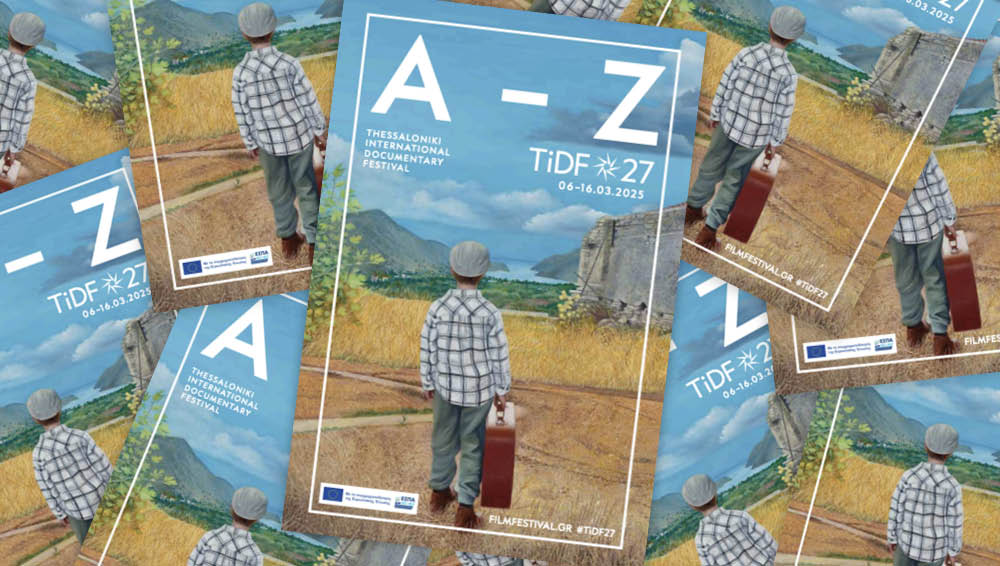18th Thessaloniki Documentary Festival
Images of the 21st Century
11-20 March 2016
PRESS CONFERENCE
CLAUDE LANZMANN SPECTRES OF THE SHOAH/EUROPE, SHE LOVES/KILLA-DIZEZ LIFE AND DEATH IN THE TIME OF EBOLA
Images of the 21st Century
11-20 March 2016
PRESS CONFERENCE
CLAUDE LANZMANN SPECTRES OF THE SHOAH/EUROPE, SHE LOVES/KILLA-DIZEZ LIFE AND DEATH IN THE TIME OF EBOLA
As part of the 18th Thessaloniki Documentary Festival, directors Jan Gassmann (Europe, She Loves), Nico Piro (Killa Dizez - Life and Death In The Time Of Ebola) and Adam Benzine (Claude Lanzmann: Spectres of the Shoah) attended a press conference on Tuesday March 15th, 2016.
Jan Gassmann was the first to speak. In his documentary Europe, She Loves he observes the lives of four couples in four European cities
- Seville, Dublin, Tallinn and Thessaloniki - and their struggle through the economic and social crisis. Approximately a hundred couples participated in the documentary’s casting process, while Mr. Gassmann chose these four cities, as they are situated on the edge of Europe and in addition because they were unknown to him, in cinematic terms. "I tried to focus on the 'I' and the 'We' of our generation", the director remarked. He had to build a strong bond of trust with the couples he filmed, as the documentary portrays their nakedness, literally and metaphorically. “I made it clear right from the start that there will be nudity in the film and for this to happen we absolutely need to establish trust between us. Sexuality makes things easier indeed, as it allows people to face their sentiments with greater sincerity. I told them that if they wanted, we could be nude too", Mr. Gassmann explained. "There is always guidance during the shooting of a documentary", as the director noted, however, certain couples had given him keys to their houses, so they could be there in the morning and film them while sleeping, as he also confirmed. The film does not simply present the story of these four couples, but according to the director, "the story of Europe in this present circumstance. We wanted to draw a portrait of Europe through the people of our generation. I wasn't interested in statistics or reports. I wanted to see through the prism of a lost generation and its relationships, a generation that didn't manage to get what it wanted”.
Nico Piro, on his part, had lived through difficult situations as a war correspondent. While directing Killa Dizez - Life and Death in the Time of Ebola, he left behind his two-year old son and his six-month pregnant wife, in order to cover an issue that the Western media presented from a specific point of view. “I do not know if I made a documentary or an extended news' report. For me, it is an act of documentation and moral revolt I felt I owed to do as person and a father. The Western media were dealing exclusively with the 16 cases of people that survived Ebola in Western hospitals. We didn't care about the millions of people that were coexisting with an invisible enemy. We deliberately chose to ignore 12.000 dead people”, Mr. Piro said. This documentary shows exclusive footage from inside the so-called “red zone,” the confinement area and ICU ward where highly contagious patients are treated. "The situation there is under control", the director noted, but he also chose to visit stations of population concentration and cemeteries, in order to reach the center of the epidemic and make a film on “how it is to live in an epidemic outburst”. He also added: "The most shocking aspect is the disease's stigma. Africa might be a developing country thanks to Chinese investments, but it remains socially underdeveloped. Sierra Leone was a country recovering from civil war when the epidemic broke out".
In Claude Lanzmann: Spectres of the Shoah, director and journalist Adam Benzine explores the arduous 12-year journey of director Claude Lanzmann that led to the creation of the epic Shoah, one of the most important films ever made about the Holocaust. Already acquainted with the work of Lanzmann, Mr. Benzine discovered afterwards that the director had a quite adventurous life himself; he was Simone de Beauvoir's companion, while he joined the resistance during World War II and later fought in the Algerian War of Independence. "His story had never been told. I wanted to recount it and see how it led to the creation of Shoah. It was difficult to approach him. I got turned down a lot of times. With the help of a friend at BBC, who convinced him that the documentary was worth doing, in light of Shoah's anniversary release, I finally made it. Lanzmann reluctantly agreed and it was difficult for him not to have creative control over my work”, the director said. People who personally knew Lanzmann share their thoughts in the beginning of the film. Among them, a former friend who describes Lanzmann as a megalomaniac. "Initially, I wanted to give the film a context, to show how others saw Lanzmann: as someone really hard to cope with, but a genius as well. That preface was very useful for those who don't know the director, but, from then on, I didn't want anyone else to intervene. I chose to stay by his side for this journey”, Mr. Benzine concluded.















